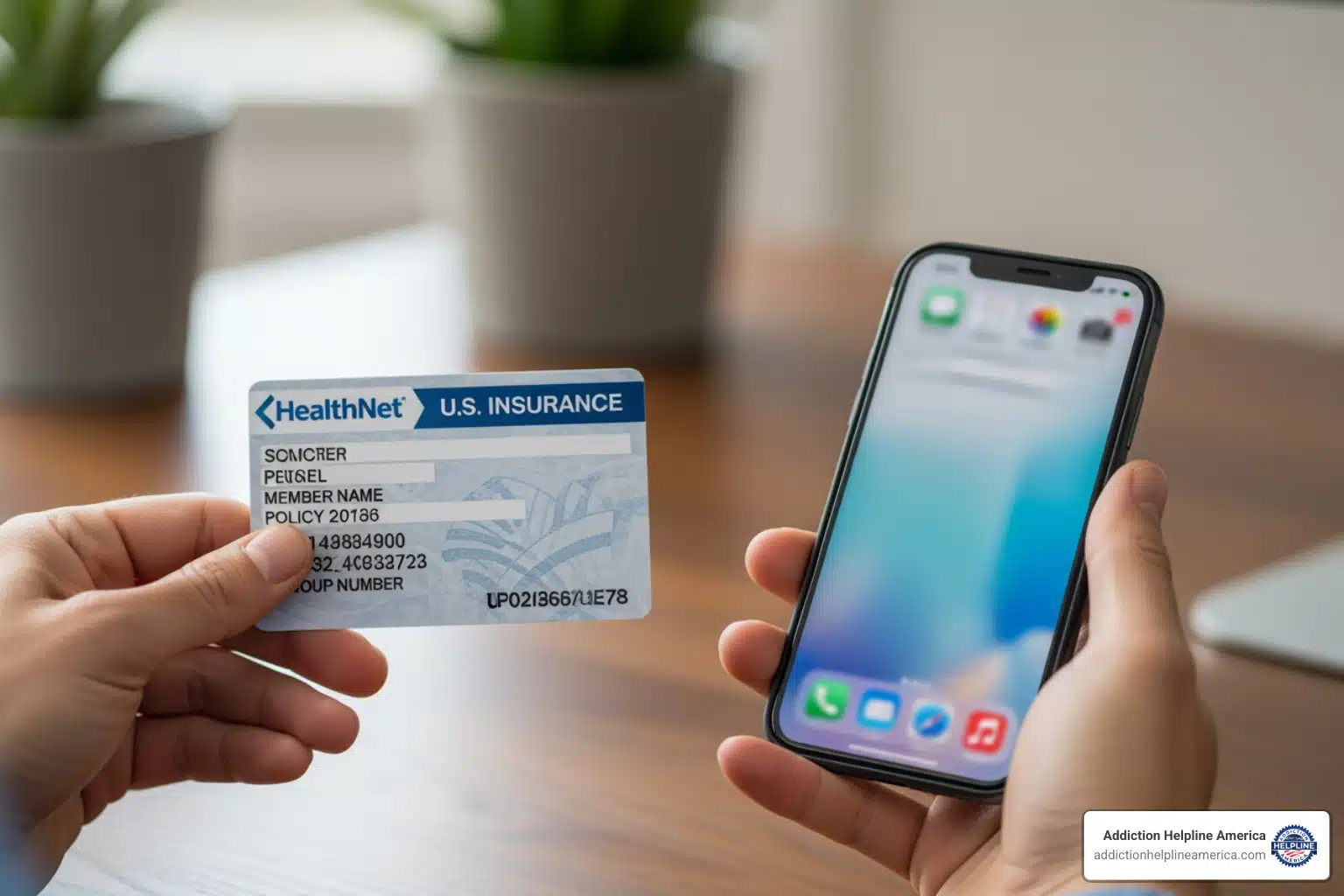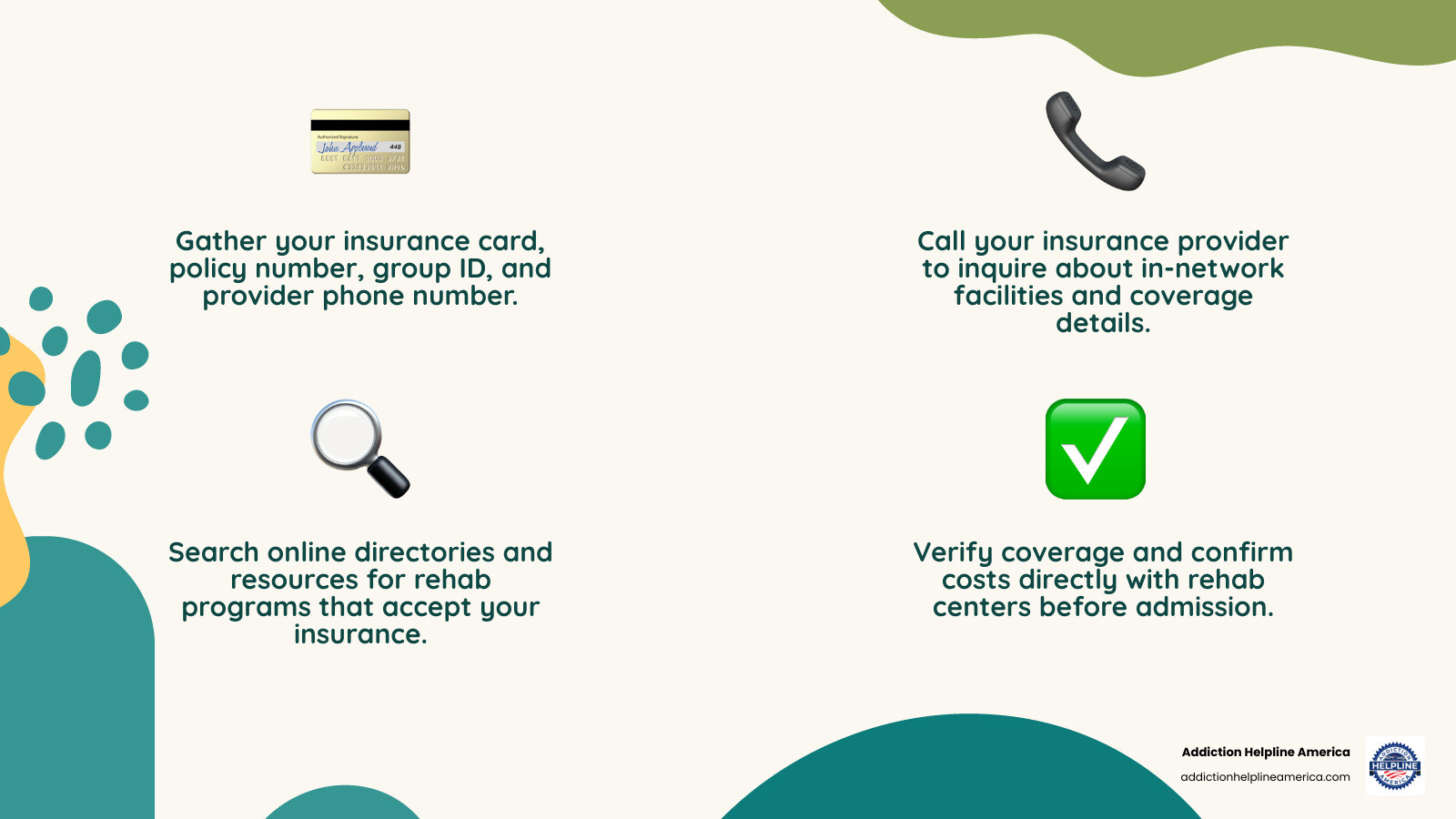
Why Finding Rehab Programs That Accept Insurance Matters
How to find rehab programs that accept insurance involves a clear process to maximize your benefits and minimize out-of-pocket costs. By following a few key steps, you can access quality addiction treatment without the financial burden feeling so overwhelming.
Quick Steps to Find Rehab Programs That Accept Your Insurance:
- Gather your insurance card – Have your policy number, group ID, and provider phone number ready.
- Call your insurance provider – Ask for a list of in-network addiction treatment facilities and coverage details.
- Search online directories – Use resources like facility-specific search tools to find options.
- Verify coverage directly – Contact rehab centers to confirm they accept your plan and understand your costs.
Understanding your insurance coverage opens doors to recovery. Thanks to laws like the Affordable Care Act (ACA) and the Mental Health Parity and Addiction Equity Act (MHPAEA), substance use disorder treatment is an essential health benefit. This means most insurance plans must cover it and cannot impose stricter limits on addiction treatment than on other medical conditions.
Still, navigating the insurance landscape is a common barrier to treatment. At Addiction Helpline America, we specialize in helping individuals and families find rehab programs that accept their insurance. Our team can quickly connect you with treatment options that align with your coverage and recovery needs, removing financial roadblocks when time is critical.
Important how to find rehab programs that accept insurance terms:
Understanding Your Insurance Coverage for Addiction Treatment
When you or a loved one is struggling with addiction, confusion about insurance is the last thing you need. Fortunately, the Affordable Care Act (ACA) and the Mental Health Parity and Addiction Equity Act (MHPAEA) mandate that most health plans cover substance use disorder treatment similarly to other medical conditions. Understanding your specific plan is the first step in how to find rehab programs that accept insurance.
If you’re wondering what treatment is like, our guide on What Is Drug Rehab Like? can walk you through what to expect.
What types of insurance are typically accepted?
Most rehab centers work with a wide range of both private and public insurance.
Private health insurance includes plans from major providers like Aetna, Blue Cross Blue Shield, Cigna, and UnitedHealthcare. These are often PPO plans, which offer flexibility to see both in-network and out-of-network providers (though staying in-network is cheaper), or HMO plans, which have a more restricted network and may require referrals but often have lower costs.
Public insurance programs are government-funded and serve specific populations. These include:
- Medicaid: Provides coverage for low-income individuals and families.
- Medicare: Primarily serves people 65 and older and some younger individuals with disabilities. Parts A (hospital) and B (medical) can cover inpatient and outpatient addiction treatment.
- VA benefits: Available to veterans and military families for a full range of addiction treatment.
- CHIP: The Children’s Health Insurance Program provides low-cost coverage for children.
- State-financed plans: Many states offer additional plans for residents who meet certain criteria.
Identifying your insurance type is the foundation for finding a facility that accepts your plan.
The Difference Between In-Network and Out-of-Network
These terms directly impact your costs. An in-network rehab center has a contract with your insurance company, which means lower negotiated rates and significant cost savings for you. Your insurance covers a larger portion of the bill, and you’ll have lower deductibles and copayments.
An out-of-network facility does not have a contract with your insurer. While some PPO plans offer partial coverage, you will face higher out-of-pocket costs. Your deductible and coinsurance will be higher, and you could be subject to balance billing—where the provider bills you for the difference between their charges and what your insurance pays. Pre-authorization is almost always required for out-of-network care, and skipping it can lead to a denied claim. Prioritizing in-network facilities is the safest way to avoid financial surprises. Our Local Rehab Centers Complete Guide can help you find options.
Decoding Your Benefits and Potential Out-of-Pocket Costs
Even with insurance, you’ll likely have some out-of-pocket costs. Understanding these terms is key:
- Deductible: The amount you pay before your insurance coverage begins.
- Copayment (Copay): A fixed fee you pay for a service, like a therapy session.
- Coinsurance: A percentage of the cost you pay after meeting your deductible.
- Out-of-Pocket Maximum: The most you will pay for covered services in a year. Once you hit this limit, your insurance pays 100%.
Coverage also varies by the level of care. Inpatient rehab (living at the facility) is more intensive and expensive, while outpatient rehab (attending treatment while living at home) is more flexible. Your plan will likely cover both, but the limits and your costs will differ. Detox coverage is usually included when medically necessary.
If you’re dealing with co-occurring disorders like depression or anxiety alongside addiction, the MHPAEA ensures this integrated treatment is covered. Treating both simultaneously is crucial for successful recovery, as explained in our guide on Rehab Centers for Co-Occurring Disorders.
How to Find Rehab Programs That Accept Insurance: A Step-by-Step Guide
Finding the right rehab program can feel overwhelming, but a proactive, step-by-step approach to your insurance will save you time, stress, and money. Breaking down how to find rehab programs that accept insurance into manageable steps removes the guesswork. This roadmap guides you from confusion to clarity. If you need help starting the conversation about treatment, our Drug Intervention Services can provide support.
Step 1: Prepare Your Insurance Information
Before making any calls, gather your insurance information. This simple step will make the process much smoother.
Have your insurance card ready and locate your policy number (or member ID), group ID (if applicable), and the provider phone number on the back. You should also have your full name, date of birth, and Social Security Number (SSN) handy for identity verification. Being prepared allows insurance representatives and admissions staff to give you precise answers quickly.
Step 2: Contact Your Insurance Provider Directly
Don’t guess about your coverage—every plan is different. Calling your insurance provider is the only way to know exactly what they will pay for.
Call the member services number on the back of your insurance card and state that you are seeking coverage information for substance use disorder treatment. Key questions to ask include:
- Can you provide a list of in-network addiction treatment facilities?
- Is pre-authorization required for inpatient or outpatient care? What is the process?
- What are my specific costs: deductible, copayments, coinsurance, and out-of-pocket maximum?
- Are there any limitations on coverage, such as the number of days for inpatient treatment or therapy sessions?
- Is medication-assisted treatment covered?
Take detailed notes during the call, including the date, time, and the representative’s name for future reference. This conversation is an essential part of how to find rehab programs that accept insurance.
Step 3: Use Online Directories and Resources to find rehab programs that accept insurance
With a clear understanding of your benefits, you can now search for facilities. Online directories are excellent tools for this.
- Addiction Helpline America’s Rehab Directory: Our search tool allows you to filter by insurance provider, location, level of care, and more to find facilities in our nationwide network.
- SAMHSA’s FindTreatment.gov: This confidential federal database lets you search for facilities across the country and filter by payment options, including specific insurance types.
- State government websites: Your state’s department of health or substance abuse services often lists licensed providers, which is especially helpful for finding facilities that accept Medicaid.
These tools help you create a shortlist of potential rehab centers. For specialized care, our guide on the Best Detox Facilities Near Me can also be a useful resource.
Step 4: Verify Coverage Directly with Rehab Centers
This is the final, crucial step: confirming everything directly with the rehab centers on your list.
Call the admissions coordinator at each facility and ask for a Verification of Benefits (VOB). This is a free, confidential service where the facility contacts your insurance company on your behalf to confirm exactly what your plan will cover for their specific program.
Provide your insurance details accurately. Once the VOB is complete, the facility will provide a clear financial picture, including:
- Whether they are in-network or out-of-network.
- Your estimated out-of-pocket costs (deductible, copays, coinsurance).
- Any required upfront payments.
- Details on covered services and any limitations.
Also, ask about their billing practices and if they offer payment plans. This direct verification eliminates surprises and provides the peace of mind needed to focus on recovery. This step is key in how to find rehab programs that accept insurance, as the facility’s expertise can help you maximize your benefits.
Navigating Public Insurance and Financial Assistance
Not everyone has private insurance, and even those who do may find coverage gaps. Public insurance and financial assistance programs are lifelines designed to ensure that cost is not a barrier to recovery. Understanding how to find rehab programs that accept insurance like Medicaid or Medicare is vital for many. For immediate local guidance, resources like our Addiction and Rehab Hotlines Florida Numbers can be a great help.
How to Find Rehabs That Accept Medicaid or Medicare
The Affordable Care Act (ACA) made substance use disorder treatment an essential health benefit, expanding access for millions through public insurance.
Medicaid, which is state-administered, now covers a comprehensive range of addiction services in states that expanded their programs. To find participating facilities, visit your state Medicaid agency website to search their provider directory or call their helpline. Online resources like SAMHSA’s FindTreatment.gov also allow you to filter for facilities that accept Medicaid.
Medicare is a federal program for people 65 or older and younger individuals with certain disabilities. Part A covers inpatient care, while Part B covers outpatient services like therapy. Part D can help cover medications used in treatment.
For both Medicaid and Medicare, the process is the same: use online directories to find potential centers, then call the facility directly to verify they accept your plan and to understand any potential copayments or deductibles.
What If Insurance Doesn’t Cover the Full Cost?
If there’s a gap between what your insurance covers and what you can afford, don’t give up. Several options exist to make treatment affordable:
- Sliding-scale fees: Many centers adjust their rates based on your income.
- Payment plans: Facilities may allow you to pay your portion of the cost over several months or years.
- Rehab scholarships and grants: Non-profits and government agencies, like SAMHSA, provide funds to help cover treatment costs. Ask facilities if they offer scholarships or know of organizations that do.
- Non-profit organizations: Groups like The Salvation Army and other community-based programs offer free or low-cost treatment.
- Veterans Affairs (VA) benefits: Veterans and their families have access to comprehensive addiction treatment through the VA system.
At Addiction Helpline America, we are experienced in navigating these financial options. We can help you find a path to affordable treatment. Healing family relationships is also part of recovery, and our Family Therapy in Addiction Recovery resource can help.
Frequently Asked Questions about Using Insurance for Rehab
When you’re facing the challenge of finding treatment, questions naturally arise—especially when it comes to insurance. We’ve heard them all, and we want you to feel confident and informed as you steer how to find rehab programs that accept insurance. Let’s address some of the most common concerns that come up in our conversations with families and individuals seeking help.
Is addiction treatment considered an essential health benefit?
Yes. Thanks to the Affordable Care Act (ACA), substance use disorder treatment is an essential health benefit. This means most health plans sold on the Marketplace, as well as individual and small group plans, must provide coverage. Furthermore, the Mental Health Parity and Addiction Equity Act (MHPAEA) ensures that insurers cannot impose stricter limits on addiction treatment than they do for other medical care. Pre-existing conditions like addiction cannot be used to deny coverage.
How does coverage differ for inpatient vs. outpatient rehab?
Coverage depends on the level of care and medical necessity.
Inpatient or residential rehab provides 24/7 intensive care and is the most expensive option. Insurers typically cover it when a clinical assessment deems it medically necessary. Pre-authorization is usually required, and plans often have limits on the length of stay.
Outpatient rehab (including PHP and IOP) is more flexible and less expensive, allowing you to live at home while attending treatment. Insurance generally covers these services, often with copayments for each session. Pre-authorization may still be needed. Our Outpatient Rehab Tulsa guide offers more details on this option.
Your specific diagnosis and plan benefits will determine the exact coverage, which is why verification is so important.
What information should I have ready when calling a rehab center?
Being prepared makes the admissions process faster and easier. Have the following information handy when you call:
- Your full name and date of birth
- Your insurance provider’s name (e.g., Aetna, Cigna)
- Your policy or member ID number from your insurance card
- Your group ID, if applicable
- The customer service phone number on the back of your insurance card
- A general idea of the treatment you need (e.g., detox, residential, outpatient)
With this information, the admissions team can quickly perform a Verification of Benefits and give you an accurate estimate of your costs, a key step in how to find rehab programs that accept insurance.
Take the Next Step Toward Recovery
You’ve made it through a lot of information, and we know navigating the intersection of insurance and addiction treatment isn’t easy. But here’s what matters most: understanding how to find rehab programs that accept insurance is about opening doors, not closing them. It’s about making recovery accessible, not intimidating.
Throughout this guide, we’ve walked through the essential steps together. You’ve learned how to gather your insurance information, how to speak confidently with your insurance provider, where to search online for facilities, and why verifying coverage directly with rehab centers is non-negotiable. These aren’t just administrative tasks – they’re the building blocks of your recovery journey.
Verification is the golden rule. We can’t stress this enough. Call your insurance company to understand what your plan covers. Then call the rehab centers themselves to confirm they accept your specific plan and to get an accurate picture of your financial responsibility. This two-step verification process protects you from surprises and ensures you’re making informed decisions when time and clarity matter most.
Cost should never stand between you and healing. We’ve covered the many safety nets in place: the Affordable Care Act’s classification of addiction treatment as an essential health benefit, the Mental Health Parity and Addiction Equity Act’s protections, Medicaid and Medicare coverage, sliding-scale fees, payment plans, scholarships, and grants. These aren’t just programs on paper – they’re lifelines that have helped countless individuals access the care they desperately need.
The truth is, recovery is not only possible, it’s happening every day. People who felt exactly as overwhelmed as you might feel right now are living healthy, fulfilling lives because they took that first step. The path forward doesn’t have to be perfect, and you don’t have to figure it all out alone.
At Addiction Helpline America, we’ve built our entire mission around one simple idea: connecting you to the right treatment shouldn’t be complicated. We offer free, confidential support to help you understand your insurance benefits, identify in-network facilities across the country, and explore every financial option available to you. Our team knows the landscape – from California to Florida, from Texas to Indiana – and we’re here to guide you through it with patience and care.
If you’re ready to take that next step, or if you simply need someone to talk to about your options, we’re here. No judgment, no pressure, just genuine help when you need it most. Find the right rehab program for you and start your journey toward a healthier, brighter future today.
Our helpline is 100%
free & confidential
If you or someone you care about is struggling with drug or alcohol addiction, we can help you explore your recovery options. Don’t face this challenge alone—seek support from us.
Contact Our 24/7 Free & Confidential Insurance-Verification Helpline
Resources
Will my insurance
cover addiction
treatment?
We're ready to help
Find the best
drug or alcohol treatment
center
Are you or a loved one struggling with addiction? Call today to speak to a treatment expert.
















